- Clone
- DJR3 (See other available formats)
- Regulatory Status
- RUO
- Other Names
- TRAIL-R3, TRID, LIT, CD263, TNFRSF10C
- Isotype
- Mouse IgG1, κ
- Ave. Rating
- Submit a Review
- Product Citations
- publications
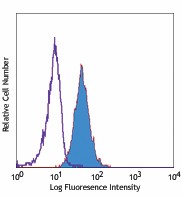
-

Human peripheral blood granulocytes stained with DJR3 PE
| Cat # | Size | Price | Quantity Check Availability | Save | ||
|---|---|---|---|---|---|---|
| 307005 | 25 tests | 113€ | ||||
| 307006 | 100 tests | 244€ | ||||
DcR1 is a 65 kD GPI-anchored member of the TNFR superfamily (TNFRSF10C) also known as TRAIL-R3, TRID, CD263, and LIT. Although not expressed by most tumors, DcR1 is expressed at low levels on normal tissues, acting as a TRAIL decoy receptor, thus inhibiting apoptosis. DcR1 is termed a decoy receptor, as it does not have a functional death domain to induce apoptosis following TRAIL ligation.
Product DetailsProduct Details
- Verified Reactivity
- Human
- Antibody Type
- Monoclonal
- Host Species
- Mouse
- Immunogen
- Extracellular domain of DcR1-human IgG1 Fc fusion protein
- Formulation
- Phosphate-buffered solution, pH 7.2, containing 0.09% sodium azide and BSA (origin USA)
- Preparation
- The antibody was purified by affinity chromatography, and conjugated with PE under optimal conditions.
- Concentration
- Lot-specific (to obtain lot-specific concentration and expiration, please enter the lot number in our Certificate of Analysis online tool.)
- Storage & Handling
- The antibody solution should be stored undiluted between 2°C and 8°C, and protected from prolonged exposure to light. Do not freeze.
- Application
-
FC - Quality tested
- Recommended Usage
-
Each lot of this antibody is quality control tested by immunofluorescent staining with flow cytometric analysis. For flow cytometric staining, the suggested use of this reagent is 5 µl per million cells in 100 µl staining volume or 5 µl per 100 µl of whole blood.
- Excitation Laser
-
Blue Laser (488 nm)
Green Laser (532 nm)/Yellow-Green Laser (561 nm)
- Application Notes
-
Additional reported applications (for the relevant formats) include: The DJR3 antibody is useful for immunofluorescent staining and flow cytometric analysis of DcR1/TRAIL-R3 receptor expression. For most successful immunofluorescent staining results, it may be important to maximize signal over background by using a relatively bright fluorochrome-antibody conjugate (Cat. No. 307006) or by using a high sensitivity, three-layer staining technique (e.g., including a biotinylated antibody (Cat. No. 307004) or biotinylated anti-mouse IgG second step (Cat. No. 405303), followed by SAv-PE (Cat. No. 405204)).
-
Application References
(PubMed link indicates BioLegend citation) -
- Uno K, et al. 2003. Blood 101:3658.
- Sato K, et al. 2005. J. Immunol. 174:4025.
- Product Citations
-
- RRID
-
AB_2205089 (BioLegend Cat. No. 307005)
AB_2205089 (BioLegend Cat. No. 307006)
Antigen Details
- Structure
- TNFR superfamily, GPI-anchored, truncated death domain, 65 kD
- Distribution
-
Most normal tissues, not tumors
- Function
- TRAIL decoy, inhibits apoptosis
- Ligand/Receptor
- TRAIL
- Biology Area
- Apoptosis/Tumor Suppressors/Cell Death, Cell Biology, Immunology
- Molecular Family
- CD Molecules, Cytokine/Chemokine Receptors
- Antigen References
-
1. Schneider P, et al. 1997. J. Biol. Chem. 272:25417.
2. Pan G, et al. 1997. Science 277:815. - Gene ID
- 8794 View all products for this Gene ID
- UniProt
- View information about CD263 on UniProt.org
Related FAQs
- What type of PE do you use in your conjugates?
- We use R-PE in our conjugates.
Other Formats
View All CD263 Reagents Request Custom Conjugation| Description | Clone | Applications |
|---|---|---|
| PE anti-human DcR1 (TRAIL-R3, CD263) | DJR3 | FC |
Customers Also Purchased
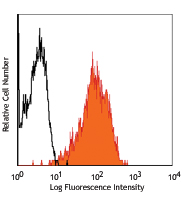
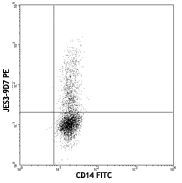
Compare Data Across All Formats
This data display is provided for general comparisons between formats.
Your actual data may vary due to variations in samples, target cells, instruments and their settings, staining conditions, and other factors.
If you need assistance with selecting the best format contact our expert technical support team.
-
PE anti-human DcR1 (TRAIL-R3, CD263)
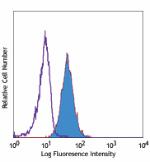
Human peripheral blood granulocytes stained with DJR3 PE

 Login / Register
Login / Register 










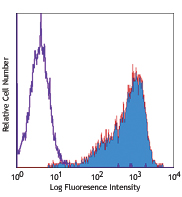
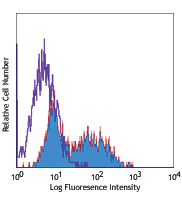



Follow Us